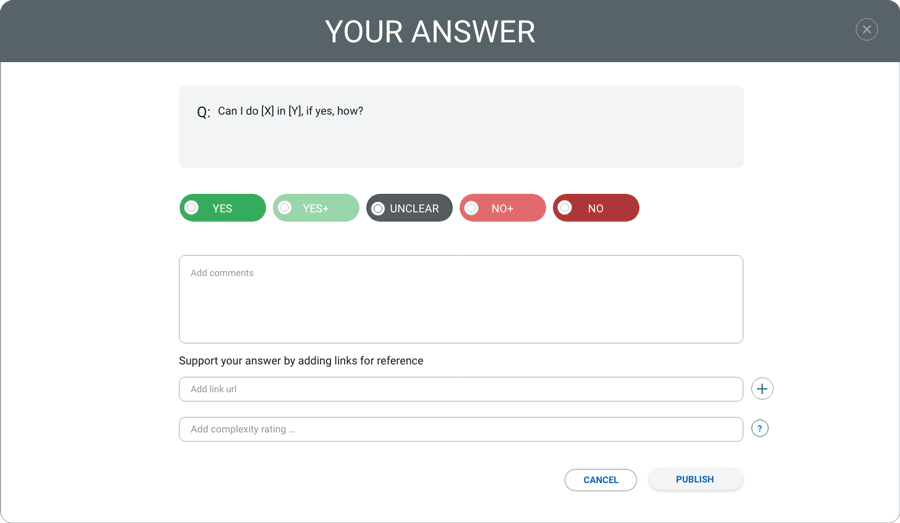A: SenseCheck

- 0 Yes
- 6 No
- 2 Other
- 22 Jun 2020
-
No
|
Simple
No, answering is easier because the text in a response does not have to conform to a pre-set model like a closed question.
- 22 Jun 2020
-
Other
|
Complex
Other ...:
no - if you consider yourself an expert, yes - if you feel you are lacking the expertise. If you are an expert in a particular field you should be used to, and comfortable with, answering any question in that particular field. The difficulty is in how we identify and qualify the real experts. Perhaps we could add a category option in the unclear answers - UNCLEAR : I am not an expert is this area.
- 22 Jun 2020
-
No
|
Other
Both should be as simple or difficult as each other if the questions are framed appropriately which I think is something of an art in and of itself.
There will be times when the answer might be technical and / or “involved” where the process will be more time consuming than asking the question. That’s not the same as difficulty however.
I wonder whether time could be lost by a misunderstanding of what the question is seeking or plain simple bad drafting. Getting the question clear is perhaps a major thing that would need good guidance. - 22 Jun 2020
-
No
|
Simple
Good questions get good answers. The trick is to ask a question that can be answered well....
- 18 Jun 2020
-
No
|
Simple
If you are an expert in the field of the question, then answering is straightforward.
However, the incentivising the answerer is the big gap ATM. - 18 Jun 2020
-
No
|
Simple
Subject to the ongoing issues with "unclear" (even a simplified list doesn't lend itself to a discussion like this one), I think both are fine. But I'd be interested to hear your thoughts around this.
- 17 Jun 2020
-
Other
|
Complex
Other ...:
This is an important question. Most of our Senates lack active answers. Technically, the platform operates in an easy way so questions and answers are technically the same. The lack of answers is a problem for us, though, and should be high priority to solve. Part of the answer could reside in the fact that we are building trusted networks of "experts". If individuals are not comfortable in answering a question as an "expert" then 1) they may not quickly reply, 2) do more research to find data to support their answers before answering, 3) not answer? Perhaps there is a way around this by emphasizing the "debating" aspect of the Q & A, the collaboration aspect to build consensus in order to take better decisions? Perhaps the word "expert" scares off answers...for example, I may have an opinion about a question that is grounded in experience, but may not consider myself an expert in the area of the question so may not answer. I like the idea of somehow incentivizing subject matter expert contributors to join the Senates by paying them some sort of "fee" per answer, if we can get around any conflicts of interest? It is true that the incentive for the expert is new leads and business development, however, perhaps there is a way in our early stage of development to share some of our fee with Experts to get more answers?
- 17 Jun 2020
-
No
|
Simple
The Senate operates by allowing one group of people to ask questions of another group of people. Those that Ask: either may lack 'expertise', or may have 'expertise' but want to validate their position, or who want to hear answers from 'experts' with different specialisms. Those that Answer have 'expertise'.
I am interested in everyone's answer on this. We need to know: must we incentivise answers, and if yes, how. [see this question asked separately]
Askers & Answers are not necessarily on opposing teams. Yes, a legal dept asking advice from their external law firm, need to motive their law firm to respond. However, on this Innovation Senate, each of you has 'expertise' in an aspect of our business and your answers are all valid in different ways, creating a collaborative answer. We are happy to share knowledge as we are contributing to the same outcome 'success of the business'. I find it as easy to answer questions here as I do in posting content on Linkedin (and I do it for similar reasons: to be helpful & demonstrate 'expertise')








|
Comment